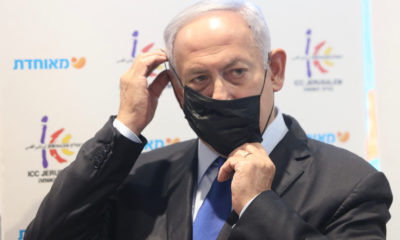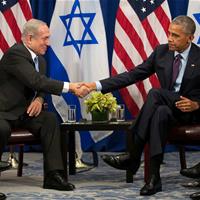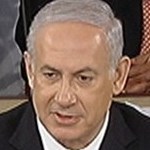
Banner
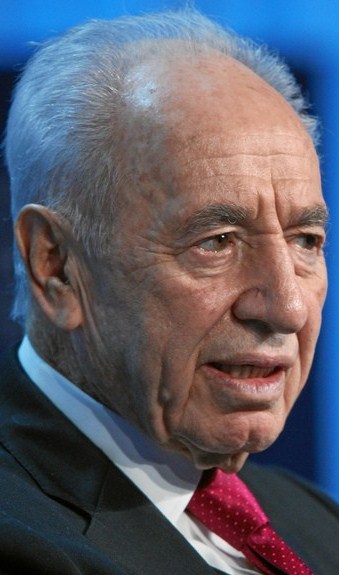
Israel & Iran get tails together in Davos
Published
10 years agoon
By
adminANT KATZ
The Office of the Israeli president issued a statement after he addressed the annual gathering of moneyed minds. Peres spoke after Rouhani and had the advantage of being able to answer him to some extent.
Two highlighted quotes on what Peres had said about Rouhani were:
“He is the only leader who doesn’t say clearly the time has come to make peace between Israel and the Arabs”
“We extend our hand for peace, including to the Iranian people, but today was a great occasion that was missed.”
 At his press conference to answer questions from the international and Israeli media at the World Economic Forum in Davos responding to the speech by Iranian President Rouhani yesterday, Peres began by addressing the speech by the Iranian President and said, “The most significant remarks were the ones he didn’t make – he didn’t express support for peace in the Middle East.
At his press conference to answer questions from the international and Israeli media at the World Economic Forum in Davos responding to the speech by Iranian President Rouhani yesterday, Peres began by addressing the speech by the Iranian President and said, “The most significant remarks were the ones he didn’t make – he didn’t express support for peace in the Middle East.
“He is the only leader I know who didn’t say clearly the time has come to make peace between Israel and the Arabs,” said Peres. “He excluded the reference to peace and when he was asked if his vision included all countries he said it included only the ones that Iran will accept, that is some definition.”
President Peres continued and said of President Rouhani, “He didn’t announce that in order to reduce the bloodshed in Syria he’s going to stop sending arms and money to Hezbollah to the stop the killing, he could have announced that seeing as he doesn’t want a nuclear bomb that he will stop building long range missiles capable of carrying nuclear warheads, he didn’t announce that Iran will stop being the centre of terror in our time. We can see their fingers in many terrible pies that endanger lives.
“As far as Israel is concerned we are ready to make peace with the Iranian people, historically they have never been our enemies, We extend our hand for peace, including to the Iranian people, but today was a great occasion that was missed,” said Peres.
In response to questions, Peres said the speech was “half a job and the most important half wasn’t done. Peace is peace for all people, without exclusion.
“President Rouhani doesn’t need the P5+1 to stop building missiles; he doesn’t need their permission to stop sending arms to Hezbollah and elsewhere. There is an offer on the table to enable Iran to have what other countries have but they have to stop threatening and terrorizing, even while making speeches like this one. There is no room to postpone.”
He sends Syria bullets, not ballots
President Peres expressed his support for Secretary Kerry’s peace-making efforts and the US position on Iran, “I believe President Obama is trying to do the right thing and the US has decided not to stop the sanctions fully until they see the results. Secretary Kerry is doing an excellent job with dynamism and determination. There are different opinions, different options and it is normal that they are being examined.”
President Peres was asked about the Iranian President’s call for elections in Syria and said, “Elections are being done by ballots not bullets, he sends bullets and that’s no way to encourage elections.”
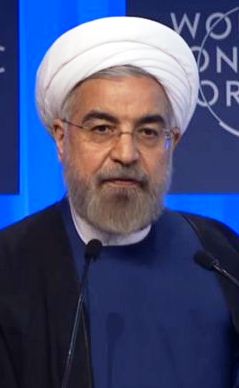 What Rouhani had to say
What Rouhani had to say
Iran is determined to negotiate a comprehensive deal on its nuclear programme with major powers so it can develop its battered economy, President Hassan Rouhani said on Thursday, inviting Western companies to seize opportunities now.
Addressing the World Economic Forum in Davos, the pragmatic president said Tehran was negotiating with the United States as part of a “constructive engagement” with the world and wanted Washington to back up its words with actions.
However, a day after a chaotic Syria peace conference from which Iran was excluded, he was unbending in his support for Syrian President Bashar al-Assad. Ending “terrorism” backed by some of Syria’s neighbours was a precondition for any settlement of the country’s civil war, he said.
Elected last year on a promise to improve Tehran’s relations with the outside world, Rouhani took the United Nations by storm in New York in September. His appearance in the Swiss resort launched phase two of a charm offensive aimed at ending sanctions that are crippling Iran’s economy.
An interim deal with the United States, Russia, China, Britain, France and Germany (known as the P5+1) came into force this week. This granted Iran a limited easing of the sanctions in return for temporary constraints on its uranium enrichment and nuclear development.
Veiled reference to Israel
Rouhani stressed his commitment to achieving a final settlement. “Iran has a serious will to come to an agreement with the P5+1,” he told the assembled business and political leaders. “I do not see a serious impediment in the way of this agreement. The Iranian will is strong.”
Asked what might prevent a long-term settlement, he cited the risk of “pressure from other parties” – a veiled reference to Israel, which denounced the interim deal as an “historic mistake” and urged the US Congress to resist it.
Rouhani broke no new diplomatic ground in his speech. In a private session with energy executives, he promised a new, attractive investment model for oil contracts by September as part of a drive to lure back Western business barred by the U.S.-led sanctions, participants said.
On Europe
Relations with Europe were being normalised now that the interim nuclear accord was being implemented, he said. Rouhani also met European Commission President Jose Manuel Barroso on the side-lines of the conference.
“Iran should use this window of opportunity with determination to move to a comprehensive long-term solution on the nuclear issue,” Barroso said in a statement. “This would open up the potential for an improved relationship and broader cooperation.”
At a separate meeting with US, European and Arab businessmen, Rouhani said Iran was seeking investment particularly in car manufacturing, oil and gas, petrochemicals, road and rail infrastructure and mining, a participant said.
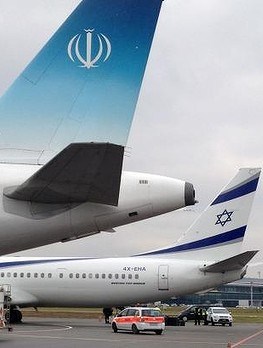
No to Israeli passport-holders
He ignored a question from two US businessmen who said they had Israeli passports and asked if they could invest in Iran. The Islamic Republic does not recognise the Jewish state.
Most sanctions, including a severe squeeze on Iran’s access to the international financial system, remain in force and the United States has stressed Western companies should not regard Iran as “open for business.”
“Prudence and moderation”
Rouhani promised to pursue a consistent foreign policy of “prudence and moderation” to revive the economy.
He called for cooperation with all Iran’s neighbours but did not mention Gulf rival Saudi Arabia by name and refused, when pressed twice, to include Israel among states with which Iran sought friendly relations.
But Bibi was not impressed
REUTERS reported that Israeli PM Benjamin Netanyahu, who was in Davos but not in the hall during the speech, said afterwards that Rouhani’s soft words bore no relation to reality, citing Iran’s military role in Syria and its support for the Palestinian Hamas movement which seeks Israel’s destruction.
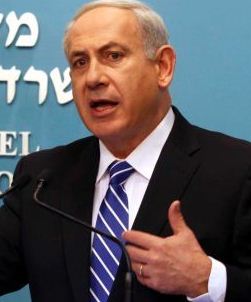 “Rouhani continues Iran’s deception show,” Netanyahu said.
“Rouhani continues Iran’s deception show,” Netanyahu said.
“The goal of the Iranian ayatollahs’ regime, that hides behind Rouhani’s smile, is to ease sanctions without giving up their programme to produce nuclear weapons,” he said, urging the international community “not to be duped”.
Rouhani repeated Iran’s standard pledge not to seek nuclear weapons and said Tehran was willing to accept all safeguards and inspections of the U.N. nuclear agency, provided it was not subjected to “discrimination”. Western countries believe the atomic effort is aimed at developing a military capability.
“We never sought and will never seek nuclear weapons,” the president said. “I declare that a nuclear weapon has no place in our security strategy.”
But in a foretaste of tough negotiations on a long-term agreement, he said: “Iran will not accept any obstacles to its scientific progress.”
Some Western energy chiefs said they were impressed by Rouhani’s commitment to attract foreign investment in the sector, which has seen production cut by a third and exports halved by the sanctions.
“The fact that the president of Iran came to the meeting today… is clearly a sign that Iran wants to open up to international oil companies,” said Paolo Scaroni, chief executive of Italy’s Eni, who was at the meeting.
But, said Bibi, Eni would stick strictly to the sanctions and return to Iran only when a permanent nuclear deal was concluded and contract terms were changed.
Oil execs were impressed
“It was an impressive presentation,” said one of three other oil executives who attended and spoke with Reuters on condition of anonymity.
The United States and other Western powers want Tehran to end high-grade uranium enrichment and shut down a heavy-water reactor capable of producing plutonium nuclear fuel under any permanent settlement. Iran rejects these steps.
With Saudi Prince Turki al-Faisal, a former intelligence chief and ambassador to the United States, sitting in the audience, Rouhani said Iran sought cooperation “with the littoral states of the Persian Gulf”. However, he did not name Saudi Arabia, which has expressed concern about the interim nuclear deal.
In a clear swipe at Riyadh and Qatar, he renewed criticism of countries he did not name which he said were supporting terrorism in Syria, saying this would rebound on them at home.
Senior Gulf Arab businessmen from Saudi Arabia and Bahrain who heard the speech said it was hard to believe Rouhani was genuine about his wish for better relations with Iran’s neighbours. They also said any trade deals would be for cash only until some payments channel could be arranged.
Iran was shut out of Wednesday’s UN-sponsored Syrian peace conference in Montreux, Switzerland, because of its refusal to endorse a framework for a transition from Assad’s rule.
Rouhani later cancelled a planned news conference and left the building without taking any questions in public, except from the World Economic Forum’s founder Klaus Schwab. Organisers cited “technical reasons”, saying they could not provide an adequate room with simultaneous interpretation at short notice.





